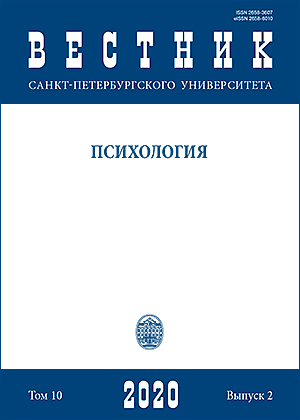The concept “life” in personal thesauri of adults
DOI:
https://doi.org/10.21638/spbu16.2020.201Abstract
In the framework of the existential-narrative approach developed by the author, a theoretical and empirical analysis of one of the levels of a personal thesaurus (the “Life”-macrothesaurus) is presented. The article contains some results of a study of the personal thesaurus of respondents of three age groups: young adults (30–40 years old), adults/mature (45–60 years old), elderly and aging (over 65 years old). The study is based on the author’s position on the hierarchical structure of a personal thesaurus, which includes: a meta-level formed by subjective ontology (1); the macro-level, consisting of two adjacent macrothesauri “Me” and “Life” (2); a mini-level consisting of existential concepts (3) and a micro-level formed by current concepts-quanta that capture a person’s distinctive existential experience (4). The study used the author’s semi-projective technique “The semantic personality thesaurus”, which includes 20 tasks for choosing verbal, imaginative, symbolic associations with the “Life”-concept, for its paremic and metaphorical comprehension, for correlating one’s own model (or life strategy) with archetypal, literary and other models, for the axial and central or peripheral placement of the content of the concept “Life” in the semantic fields of existential dichotomies, for the construction of existential dictionaries, etc. It is proved that there are significant age-related differences in the content of personal thesauri of this level. In the group of 30–40-year-old respondents, the “Life”-macrothesaurus appears as a combination of the following central units: love, development, movement, complexity. The life strategy is formulated as “catch the moment”; a significant unit is life-quality. In the group of 45–60-year-old respondents, the “Life”- macrothesaurus is generally represented by the following units: faith, home, hope, family (and children), movement / action / activity, development (or self-development), creativity, diversity, interest, charisma / blessing, mindfulness, complexity. In the group of respondents older than 65 years, the “Life”-macrothesaurus includes the following units: family, joy, happiness, love, interest, diversity, surprise, duty, responsibility, successes, activity, belief, hope, freedom, work (and labor), need (or usefulness), achievements, humility, gratitude, tranquility, repentance, sense, clarity, desire, children, memory, honor, respect.
Keywords:
personal thesaurus, hierarchical structure of the personal thesaurus, life, life path, existential experience, personality, macroconcept
Downloads
References
References
Downloads
Published
How to Cite
Issue
Section
License
Articles of "Vestnik of Saint Petersburg University. Psychology" are open access distributed under the terms of the License Agreement with Saint Petersburg State University, which permits to the authors unrestricted distribution and self-archiving free of charge.




